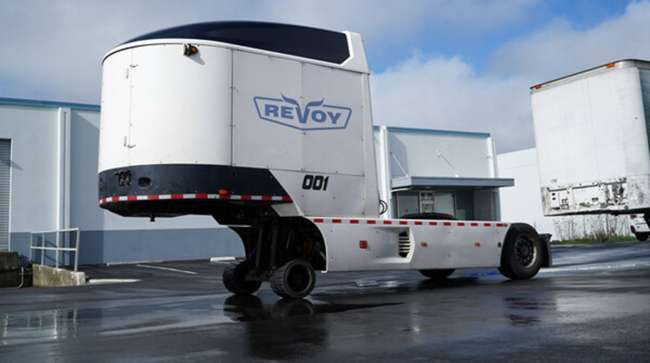Staff Reporter
Revoy Launches Atypical EV for Class 8 Freight Market

[Stay on top of transportation news: Get TTNews in your inbox.]
A Bay Area startup launched an electric add-on unit that will convert an existing Class 8 diesel vehicle into a hybrid, without any changes to the tractor, while at the same time increasing fuel economy and cutting emissions.
The kingpin of the add-on unit, made by Revoy, connects to a tractor’s fifth wheel while the fifth wheel of the add-on unit connects to the kingpin of a trailer so that the whole truck becomes a hybrid vehicle.
Sensors mirror the driver’s actions, Revoy CEO Ian Rust told Transport Topics in an interview. There is no communication with the truck, he said, adding that Revoy’s product detects the direction the tractor is moving.
Revoy’s add-on improves fuel efficiency up to 20 to 35 mpg from 6 to 8 mpg, representing a 70% to 90% plus reduction in emissions, according to the company.
Adding a Revoy boosts fuel efficiency by 80%, enabling companies to save an average of $25,000 annually in fuel per truck, it said.
“We’re essentially selling fuel,” Rust told TT. “They essentially pay us per mile. We view this as a democratizing force. An owner can see the product on a billboard and hook it up five minutes later.”
Revoy’s EV, which is technically seen as a dolly, has been operational since the end of the first half of last year, Rust said. The product has been live with a pilot customer since earlier in January, though Rust declined to identify the customer.

Rust
So far, Revoy has built four vehicles in this fifth iteration of its product. The EV has traveled 18,000 miles in research and development.
During development, Revoy built in intelligent auto-correction to prevent rollovers, flipping and jackknifing. The EV has an extra set of brakes to automatically engage more stopping power when driving down hills, blind spot detection and automatic reversing via a set of sensors.
Final assembly takes place in the city of South San Francisco, Calif. Assembly takes five months from the first purchase order to delivery, Rust said, adding that the company’s current annual production capacity is in the double digits.
Revoy handles all infrastructure and charging. Revoy EVs are charged at a swapping station. It and the trailer take two to three minutes to attach to a tractor.

At the moment, the company has two swapping stations, one in Texas and one in Arkansas. By the end of the year, Rust said he expects Revoy to have eight to 10 swapping stations in California and Oregon.
The company’s pilot customer only uses the Revoy vehicle for part of its regular trip. That customer operates a relay route, traveling among San Antonio, Dallas and Arkansas. Rust told TT some 64% of trucks on the road at the moment meeting gross vehicle weight regulations can use a Revoy EV.
Revoy’s EV allows truckers to drive up to 235 miles on electric power using a 525 kilowatt-hour lithium-iron-phosphate battery pack, the company said. An 800 kWh long-range version will be coming out in May.
“Trucking companies no longer need to charge as fast as possible or wait an age while charging is carried out” when using an EV if they use the Revoy product, Rust said.
Want more news? Listen to today's daily briefing below or go here for more info:




